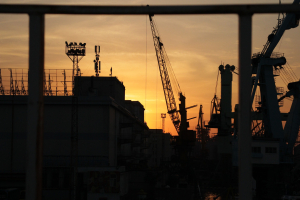
Washington/New York/Oyo: On July 23, 2022 – just 24 hours after finalizing a deal to allow the resumption of Ukrainian agricultural exports through the Black Sea, Russia launched a missile attack on the Ukrainian port of Odessa in Ukraine.
Antony J. Blinken, the United State Secretary of State, immediately registered America’s condemnation of the attack, claiming that it amounted to Russia breaching its commitments. From Odessa port, Blinken pointed out, that grain and agricultural exports were to be transported under the Black Sea arrangement.
“This attack casts serious doubt on the credibility of Russia’s commitment to yesterday’s deal and undermines the work of the UN, Turkey, and Ukraine to get critical food to world markets. Russia bears responsibility for deepening the global food crisis and must stop its aggression and fully implement the deal to which it has agreed,” Blinken stated and accused Kremlin of showing disregard for the safety and security of millions of civilians as it perpetuates its assault on Ukraine. “Russia is starving Ukraine of its economic vitality and the world of its food supply through the effective blockade of the Black Sea,” he said.

The Russian Foreign Minister Sergey Lavrov, on a visit to the Democratic Republic of Congo, dismissed the US claims as he told reporters in Oyo on July 25, that the targets on which high-precision strikes were delivered were located in a separate, military section of the Odessa port. He claimed that these included a Ukrainian Navy combat boat and an ammunition depot that had recently received Harpoon anti-ship missiles that could be used to threaten the Russian Black Sea Fleet. “Now these “harpoons” are no threat to us,” he said, and asserted, “Even unbiased analysts have confirmed what we have been talking about from the beginning: the grain terminal at the port of Odessa is located quite far from the military section. There is no obstacle that prevents grain from being shipped to buyers under the agreements signed in Istanbul. We have not created any obstacle to this.”
The United Nations – one of the signatories to the Agreement – in a way corroborated what Lavrov claimed. “…we do expect that the first ships (with grains) could move within a few days,” Farhan Haq, Deputy Spokesman for the UN Secretary-General, told reporters in New York on July 25, 2022. “We believe that work on the initiative can continue to proceed, and we do believe that ships can move. In terms of what the amount of damage (to the Odessa port) was, I would leave that to the Ukrainian authorities,” he added.
However, such claims failed to convince the US. “Russia’s brazen attack against the port city of Odessa only 24 hours after this agreement was signed, it certainly undermines the credibility of Russia’s commitments to the other parties to this deal – the United Nations, Turkey, and Ukraine,” the US State Department Spokesperson Ned Price stated in Washinton on July 25. Although he acknowledged that despite the attacks, “the parties are continuing preparations to open Ukraine’s Black Sea ports for food and fertilizer exports”, he claimed that “Moscow’s track record – when it comes to previous deals that it has struck – is not exactly a cause for optimism”.
He stressed that the attacks highlighted that “Moscow continues to behave in ways that intentionally prevent desperately needed food from reaching many of the world’s most poor, those who are suffering the most acute effects of the food insecurity that Moscow’s invasion of Ukraine has exacerbated”.
This apart, the US administration is also preparing an alternative plan to transport grain from Ukraine. “So we are looking at all options when it comes to the disposition of Ukrainian grain, and we’re working with our Ukrainian partners, who are in the first instance responsible for seeing the export of their grain because it is, again, their grain,” Price said.
Lambasting the US, Lavrov, however, said, “Our Western colleagues have become adept at distorting any news item when it can be used against Russia. Nothing surprises me anymore”.
He claimed the agreements signed on July 22 in Istanbul “say nothing about preventing us from continuing the special military operation, which can include destroying military infrastructure and other military targets. UN Secretariat representatives confirmed this interpretation of the documents yesterday.”
The US thought stuck to its offensive, with Price stating that “We will be working with our partners around the world to see to it that Moscow is held accountable for the agreement it reached”.
Incidentally, the UN Secretary-General “unequivocally condemned” the strikes in the Ukrainian port of Odessa, and giving a curious turn to the entire episode, stated on July 23 that “full implementation of the commitments by the Russian Federation, Ukraine and Turkey “is imperative”. He said the commitments to ensure the safe movement of Ukrainian grain and related products to global markets were “desperately needed” to address the global food crisis and ease the suffering of millions of people in need around the globe.
What arises doubts over Russia’s commitment to the Agreement is the Russian claim that there are secondary sanctions that impact their ability to export their grain, even as the US denies the claim on grounds that Russian grain is not in any way sanctioned. “The fact is that we have been very specific in designing this sanctions regime to see to it that food and fertilizer from Russia is entirely exempted, to see to it that companies around the world have the assurances that they need to export these products, knowing the vital role that Ukraine’s grain, Ukraine’s fertilizer – fertilizer and food from the region plays given that it is essentially a breadbasket for the world,” Price said.
Before the Russian invasion of Ukraine, Ukraine was exporting some six tons of grain per month. Ukraine is nowhere near that at the present, but Ukraine’s exports have increased month over month from February to March to April to May and in subsequent months. “So we have been able to work with them to increase those exports in some ways, but we all know that the most effective means and the largest-scale means by which to increase those exports will be through the Black Sea,” Price pointed out.
– global bihari bureau




